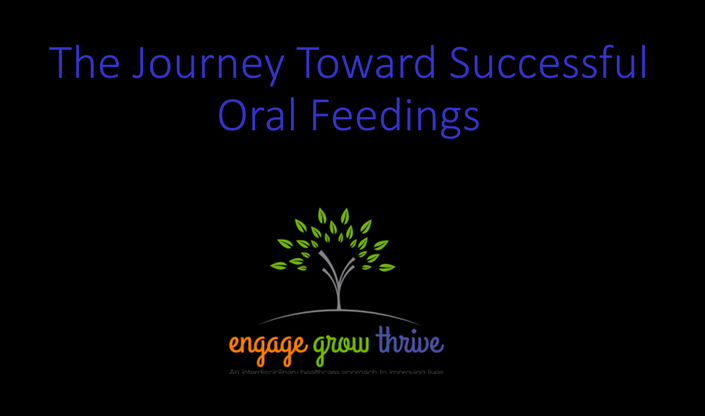
The Journey Toward Successful Oral Feeding
The journey to achieving full oral feeds is an arduous one for the preterm neonate in the NICU. It is often a primary reason the discharge to home is delayed and it is a significant frustration for families. These two presentations focus on establishing early positive experiences to support neurodevelopment for eventual oral feeding success and the process of assessing oral feeding readiness and the infant’s maturation, rather than postmenstrual, age as a cue to progressing oral feeding.
Research shows that the developing brain is extremely sensitive to incoming stimuli which can impact oral feedings. The *Pre-Feeding Strategies lecture will focus on activities and interventions that can prepare the infant and help build the foundational skills for positive, successful, and enjoyable oral feeding.
Infant directed feeding or cue-based feeding is a practice by which the care-provider utilizes infant communication through engagement cues to drive oral feeding readiness and disengagement cues to communicate completion. The goal is for infant communication to create a reciprocal feeding relationship with their care provider to drive infant feeding. The Feeding Culture in the NICU...Who's leading the team presentation will also discuss how our focus needs to be on the quality of infant feeding versus the quantity of the feeding.
Objectives:
- Discuss two ways an infant develops feeding skills in utero.
- Identify three neonatal experiences in the NICU that can negatively affect the premature infant’s future feeding skills.
- Describe three pre-feeding techniques to facilitate the foundation for positive oral feeding skills.
- List two practical clinical strategies that can help prepare families for the feeding experience in the NICU.
- Discuss three feeding competencies that help lay the foundation for feeding success between the co-regulated relationship of infant and care-provider.
- Discuss two topics for parent education related to the importance of understanding maturational age in assessing feeding readiness.
- Identify one concern parents experience after discharge that can be eased with NICU education prior to discharge.
Total CE 2.5
NCC Code NNP 1 or 7 = 2.5
NCC Code NIC 3 or 7 = 2.5
NCC Code LRN 2 or 7 = 2.5
Rx = 0
*This presentation was included in the Small Baby Care Specialist® Program
Last updated: April 2023
Your Instructor

Karin Mitchell, MA, CCC-SLP, CNT, CLE is a Speech Language Pathologist specializing in the care and treatment of pediatric feeding and swallowing, developmental care of the medically fragile infant and child, and pediatric traumatic brain injury. Liz Drake, MN, NNP, CNS, RNC-NIC is a Clinical Nurse Specialist and Neonatal Nurse Practitioner and a quality improvement enthusiast. Both Karin and Liz have a passion for neuro-protective, neuro-promotional, and family partnered care. They are active change agents in the NICU and strongly support an interdisciplinary team-based approach to care.
Course Curriculum
-
StartFeeding Culture in the NICU Part 1 (16:03)
-
StartFeeding Culture in the NICU Part 2 (6:26)
-
StartFeeding Culture in the NICU Part 3 (13:25)
-
StartFeeding Culture in the NICU Part 4 (18:49)
-
StartFeeding Culture in the NICU Part 5 (18:31)
-
StartJourney Toward Successful Oral Feeding Suggested Reading
-
StartEvaluation